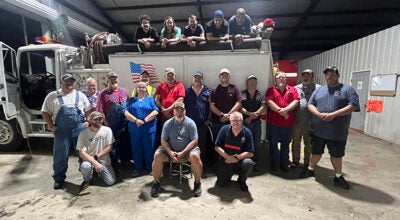Fighting the ‘state bird” — Mosquitoes
Published 10:29 pm Friday, April 20, 2018
Brandon Cobb swears they catch at least 10 different species of mosquitoes in the traps they set out throughout Brookhaven each week, but most Lincoln Countians will tell you there is only one kind — the ones that bite.
Cobb is the contract supervisor for Vector Disease Control International covering Jackson and Rankin counties and Brookhaven. VDCI secured the mosquito contract for the city in June. It will be up for renewal in December.
Between now and then is the busy time of the year for mosquito eliminators.
VDCI technicians start conducting larval surveillance and adult mosquito surveillance in April, trying to determine the mosquito distribution, density and species composition in the target area. That helps them understand the threat and address it properly.
Now is the time crews look for standing, stagnant water, so they can eliminate the mosquitoes prior to them becoming adults.
“That’s important to controlling mosquito-borne diseases like West Nile and Zika, because it stops mosquitoes before they acquire the virus and have the opportunity to transmit it to people,” Cobb said.
Cobb looks to the public for help keeping stagnant water at bay. That means removing old tires, keeping pumps on fish ponds to circulate water and replacing water in bird baths weekly. Any standing water can be a breeding ground for mosquitoes.
“Even a piece of trash like a Solo cup laying in the yard,” he said. “Mosquitoes can lay eggs in a Coke bottle cap of water.”
Cobb said by treating the larval stage, they can get ahead of the problem.
“We kill thousands of mosquitoes even before they’re mosquitoes,” he said.
Once the eggs hatch, it becomes a matter of knowing what kinds of mosquitoes are out there and where. They set traps — 10 of them — twice a week. There are two in central locations within each of the five zones VDCI established. One trap catches mosquitoes looking for a blood meal and the other traps mosquitoes ready to lay eggs.
Cobb said they catch five to 10 different species in the traps. Samples are sent to the state health department for testing.
Techs use that information to determine the best course of action for spraying for live mosquitoes and treating stagnant water.
VDCI usually sends out one truck each night to spray, covering one zone each night during the week. If the surveillance shows a need for more spraying in any of the zones, they’ll do that. Lincoln County saw a case of West Nile virus last year, and VDCI used aerial spraying in the man’s neighborhood, Cobb said.
The trucks spray in the evenings from dusk to midnight, using a contact poison that kills mosquitoes on contact.
Cobb doesn’t expect this mosquito season to be busier than usual. It was a cold winter and it hasn’t been a rainy spring, he said.





